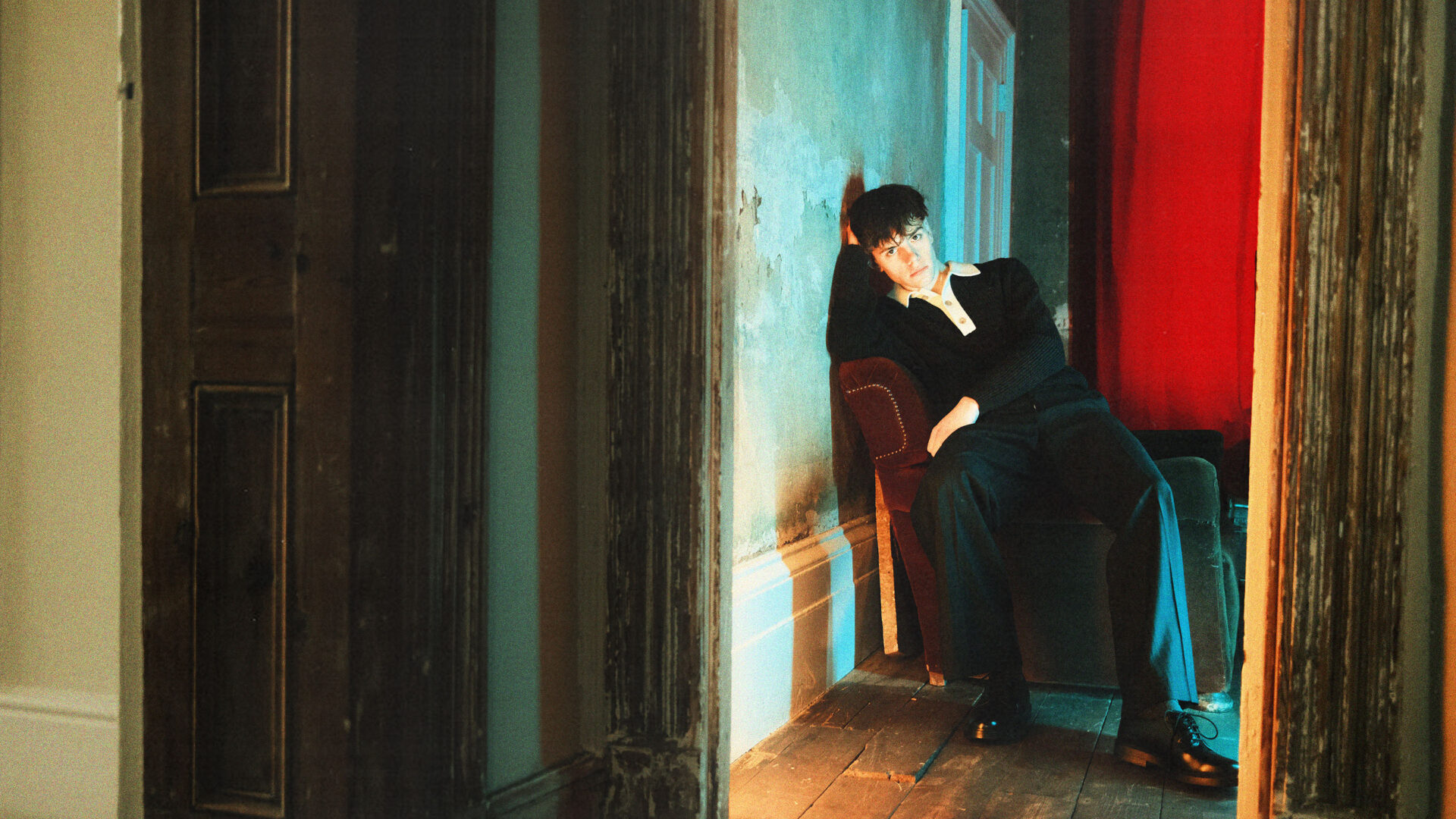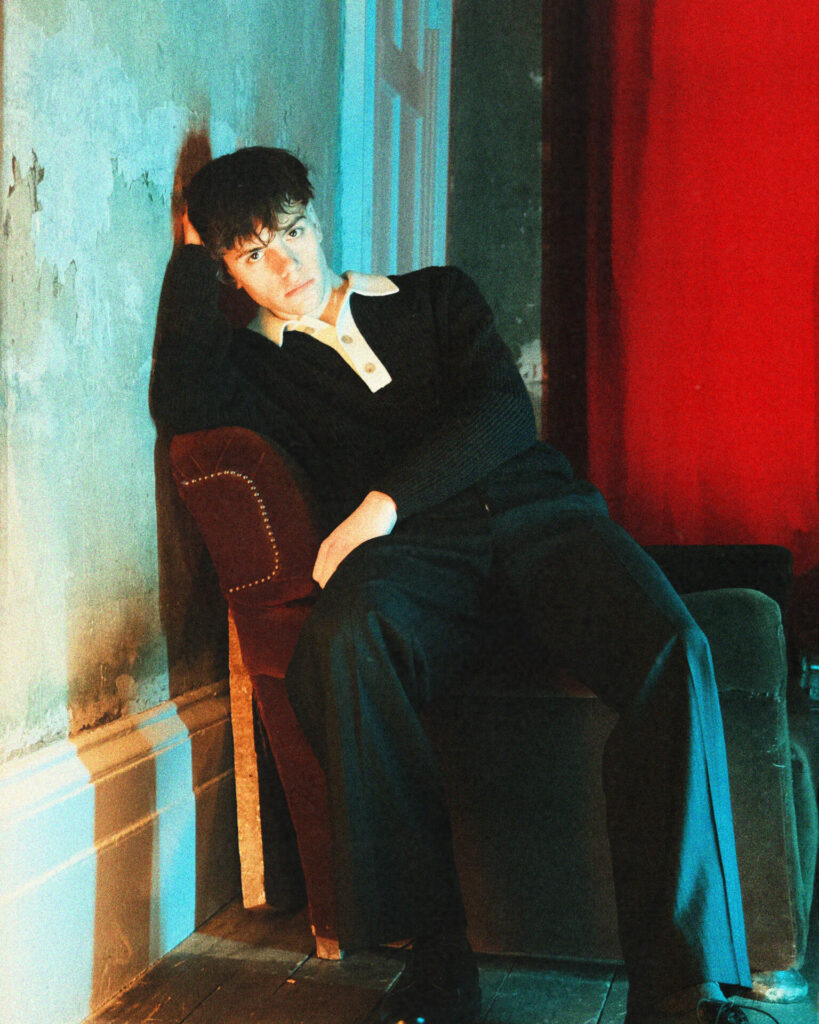Fred Roberts is emerging as a bold and honest voice in UK pop music
The singer’s new EP delivers an honest depiction of his first queer love affair, and it’s this authentic approach that’s winning him plenty of fans.
By Nick Reilly

‘You loved me through the darkness of a cinema,” Fred Roberts sings on ‘Disguise’. “Where movies played but none of them ever told our truth.”
Since that song and real-life story of secret love debuted in December 2023, the 21-year-old has found a captive audience with fans who have hailed him as a leading voice in the current rung of artists delivering queer pop that packs an almighty punch.
“You can chuck as much money as you like at a song, but you can’t buy that pure connection that is born out of experience and many years of me living and finding a romantic connection with someone,” he explains. But this is just one side of Roberts’ sound. His debut single, ‘Runaway’, was soaked in synth-pop hooks and the kind of chorus that feels fit to bring an arena to its knees. Or to put it another way: there’s seemingly no limit to what Fred Roberts and his music is truly capable of achieving…
We’re speaking the day before your EP arrives. How’s everything in the world of Fred Roberts right now?
I’m so excited. I think on one hand all I’ve ever wanted to do is release an EP, you know what I mean? I want to release music that isn’t singular songs and has the context of being part of a bigger thing. That’s what I gravitate towards, and these five tracks are together, and they tell a strong story. But at the same time, it’s like, ‘Ah! I have to do the next thing now.’
What is the story of your debut EP then?
I just started writing in lockdown, and I had never really picked apart any of my life before. I think I just went through life as a teenager, and you’re not meant to stop and look back at everything you’ve done. You just experience things, and you don’t really think too hard about them. But in lockdown I think everything stopped. I had way too much time to pick things apart, and my writing was literally my story. ‘Runaway’, the opening song, is me at the end of a journey with someone after seeing them for a long time and coming to terms with the fact that I don’t feel that sense of resentment towards them anymore.
And then the rest of the EP details exactly how I was feeling during that time with that person from the ages of 15 to 17. The last song, meanwhile, is just me right now. It’s my experience written in the most honest way and sounding like the songs that I love.
Has it been a cathartic experience then? Scary, maybe?
Well, I think people are connecting with it because they are aware that I’m not making any of this up. When someone hears it and they relate themselves to parts of my story, it means it’s real and it’s working. But yes, terrifying, too. ‘Disguise’, for example, is about the most intimate experience I’ve ever had. It’s cool that everyone knows about it now, but in a normal scenario they might not!
I’ve literally rounded off that part of my life now though. I’ve written these songs; I’ve told my story, and this EP is called Sound of My Youth for a reason.
How has the reaction to ‘Disguise’ been for you? SiriusXM’s Larry Flick hailed it for reflecting “an emotional tug of war that is unique to a young queer person”.
When I started writing music when I was growing up, Troye Sivan provided that for me. I listened to his music, and I saw myself in him and I understood how it worked. But I never thought I’d get to be a part of that. It’s on a smaller scale, but as Larry explained, it’s got a message that can transcend.
You can chuck as much money as you like at a song, but you can’t buy that pure connection that is born out of experience and many years of me living and finding a romantic connection with someone. I think with ‘Disguise’ too, it reflects that unique experience of love when you’re gay or queer. It’s so powerful to find a community of people who relate to that song and gravitate towards it. I once got a message from a guy called Dylan and he was 17 and told me that the words in that song really reflected what he was going through. It can be the coolest thing ever when you find a song like that, and the fact I’m able to make it is just crazy!

That specific situation — were people aware of it before you released the song?
I came out to my family when I was 16, so it was just before that. He was part of my life, but I don’t think people knew the exact situation, and when you’re that young no one’s going to ask you, are they? It took me a while to be open about the experience because he was kept undercover, and I think I put up a load of barriers and I shut myself off.
He actually sent me a message last week asking if the song was about him! But we’ve grown up, and ‘Runaway’ is even about not hating him because we were young and you have these experiences and people learn, and now we’re older, and it’s formed this circle where he apologised, which is nice closure.
That lad, Dylan, who messaged you, really speaks to the close bonds that Gen-Z pop stars have with their fans too, doesn’t it?
Yeah, and it’s weird because the level of engagement and interaction I’ve received from people, you only get those fans when you’re at a Harry Styles level. But I think people wanna be part of a smaller thing too, to find friends and connect with people, and they wanna queue outside of a concert and meet new people. It’s forming new spaces for people to interact in: they’re not passively listening to the music, they’re engaging with it and they’re creating stuff around it.
You were on The X Factor: The Band before branching out as a solo artist. What was that experience like and what made you want to enter that world?
It was just a fun day out, really. I mean, I’d done my GCSEs, and I went to Reading Festival and I saw all these people performing and just wondered how it had happened. An audition for X Factor, which I went to with my mum, felt like the answer. I never expected in a million years that I’d get through the first round, but it gave me the confidence, irrespective of everything else, that I desperately needed to do music.
I wanted to sing and write songs, but when you go to an academic school and you have no connections in the industry, it does feel like another world, do you know what I mean? How on Earth do you break into it? That foot in the door really helped me when I came off the show because it was a spark I needed, and I met a producer and an A&R from being on the show, too. When we lost, it felt like the worst thing that had happened to me. But it was almost the perfect scenario. I had no ties to a label; I could just do whatever I wanted. So, it was a good experience.
Did it help you see the reality of what the industry is like too?
Yes! Because I was living the dream and then it got shattered, which teaches you that things don’t last forever. It’s been good to realise that overnight success would be a dream, but it’s just not how I wanna do this forever. I want to build a fan base and I want to keep hold of the dedicated, passionate people that care about my music and my art and keep developing that. Things like that don’t happen with an overnight success on TikTok. It’s finding that balance of staying true to who I am and realising the reason people are liking the music is because it’s literally me making exactly what I wanna make. That’s what I want to keep doing.
And the rest of 2024 for you is…?
More music! I want to release one more single before the summer and continue to write. But the reception for the first three songs isn’t something I was expecting and playing all these festivals as a result of that. I’m playing Boardmasters, which is one I always loved growing up. I’m just hoping that people will continue to connect with the EP, and I can continue what I’m doing!
Taken from the June/July issue of Rolling Stone UK – you can buy it here now.
